"Catch of the day" from Algarve
- Lisbeth
- Site Admin
- Posts: 65899
- Joined: Sat May 19, 2012 12:31 pm
- Country: Switzerland
- Location: Lugano
- Contact:
Re: "Catch of the day" from Algarve
More history in the next and last  chapter
chapter
"Education is the most powerful weapon which you can use to change the world." Nelson Mandela
The desire for equality must never exceed the demands of knowledge
The desire for equality must never exceed the demands of knowledge
- Lisbeth
- Site Admin
- Posts: 65899
- Joined: Sat May 19, 2012 12:31 pm
- Country: Switzerland
- Location: Lugano
- Contact:
Re: "Catch of the day" from Algarve
Sunday the 15th of March
The day of departure from Tavira had arrived and we moved slowly north towards Lisbon, but not the direct route.
First stop and overnight was Mertola in the Natural park of the valley of the Guadiana, the river dividing Portugal and Spain.
Photo of Mertola taken from the castle showing the once mosque, now church.

Finding the way to the hotel was a kind of tour of a labyrinth You know where it is and you can even see it, but get there...
You know where it is and you can even see it, but get there...  All the roads are narrow and one way, so if you take a wrong turn you have to start all over again. Finally we managed and on the way got to know almost all the little streets of the town
All the roads are narrow and one way, so if you take a wrong turn you have to start all over again. Finally we managed and on the way got to know almost all the little streets of the town 
The town of Mértola is located on a hill by the Guadiana River, and its strategic location made it an important fluvial commercial port from Classical Antiquity through the period of Islamic domination. Among the vestiges of its past, Mértola's main church was the only medieval mosque to have survived in Portugal.
View before arriving in town
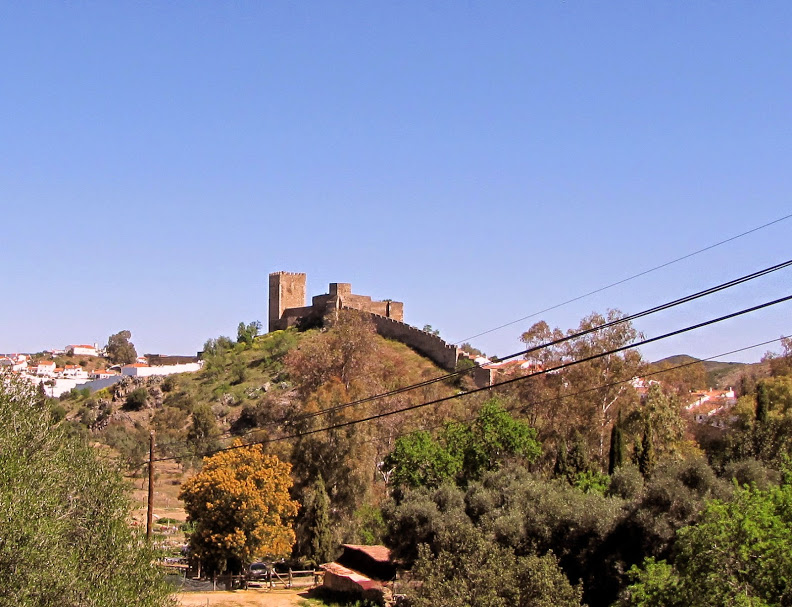
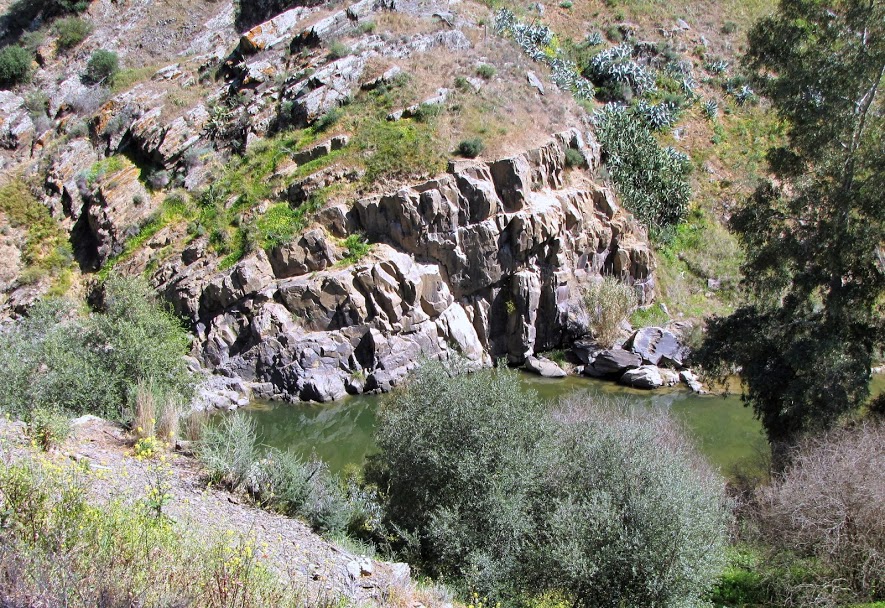
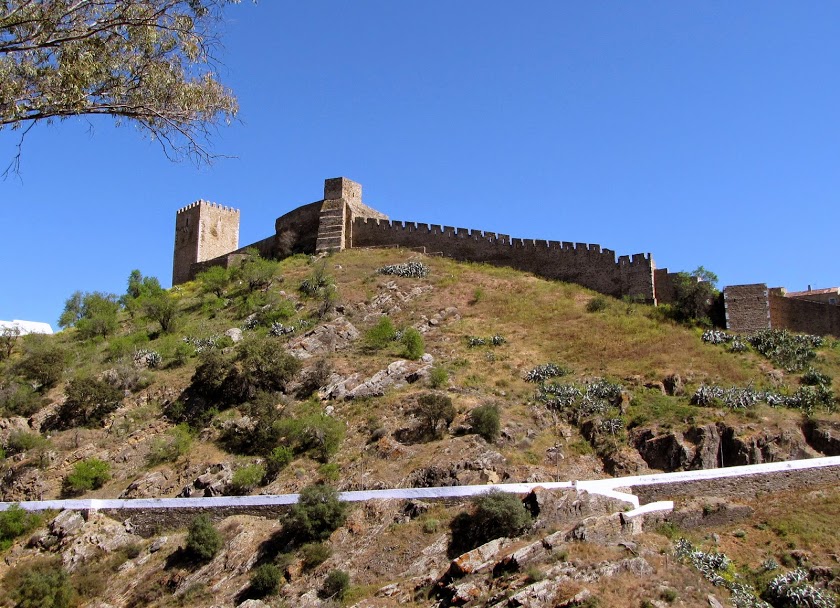
During Classical Antiquity, Mértola was inhabited by Phoenicians, Carthaginians and finally the Romans, who called it Myrtilis Iulia. The strategic location of Mértola, on a hill by the northernmost navigable part of the Guadiana river, was crucial in its early development. Agricultural products grown in the villae nearby and valuable minerals (silver, gold and tin) obtained from the lower Alentejo region were sent from the fluvial port of Mértola via the Guadiana to Southern Hispania and the Mediterranean. The town was raised to the status of a Municipium in times of Emperor Augustus and was connected to important Roman cities (Beja, Évora) through a road system.
During the Migration Period, Mértola was invaded by Germanic tribes of the Sueves and the Visigoths. In this period (5th-8th centuries) commerce was reduced but still active, as evidenced by Greek tombstones from the 6th-7th centuries found in Mértola which suggest the presence of Byzantine merchants in the town.
The river Guadiana
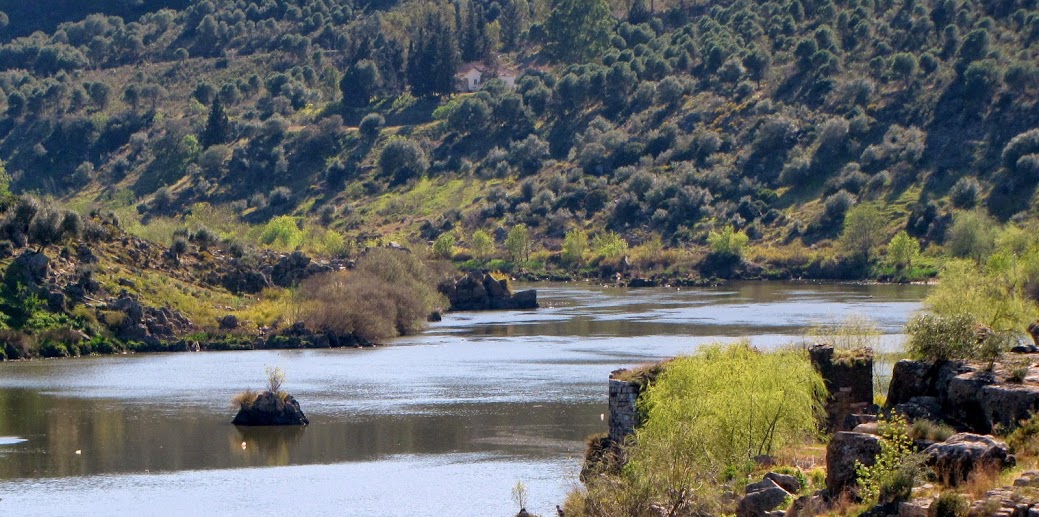
First thing we went to see the Mosque/Church and the castle, quite a climb also having done half of it by car
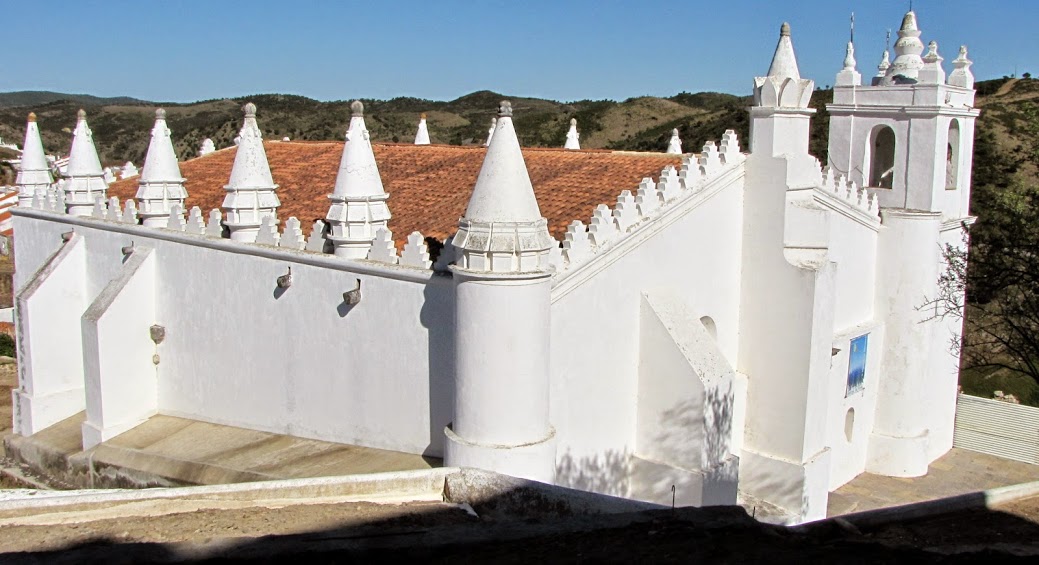
Around the year 711, Hispania was invaded by the Moors from the Maghreb, inaugurating a period of great influence of Islamic culture in the Alentejo region that would last nearly 500 years. Mértola - then called Martulah - and its port played an important economic role in the commerce of agricultural and mineral goods between the Alentejo and other parts of Al-Andalus (Arab Hispania) and Northern Africa.
Mértola had a wall dating from Roman times, but the Muslims built new fortifications and, eventually, a castle to protect it from rival Muslim and Christian states. After the fall of the Caliphate of Córdoba, in 1031, Mértola became an independent taifa state, until it was conquered by the taifa of Seville in 1044-1045. Between 1144 and 1150 the town was again seat of an independent state led by Ibn Qasi, a mystic and skilled military leader who unified Southern Portugal and fought the power of the Almoravides. The independence of the region, however, was soon ended by an invading Almohad army. The most important remnant from the Islamic period of Mértola is its mosque, built in the second half of the 12th century and later turned into a church, but which still preserves many of its original characteristics.
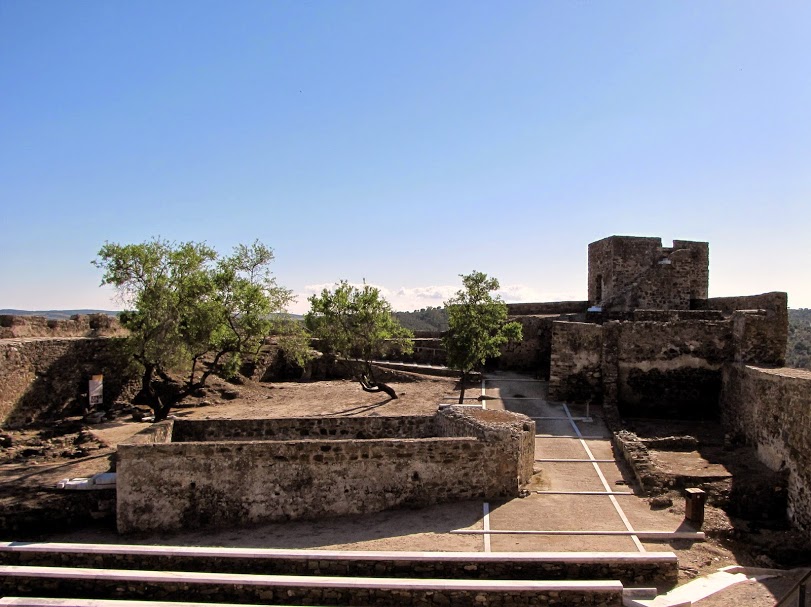
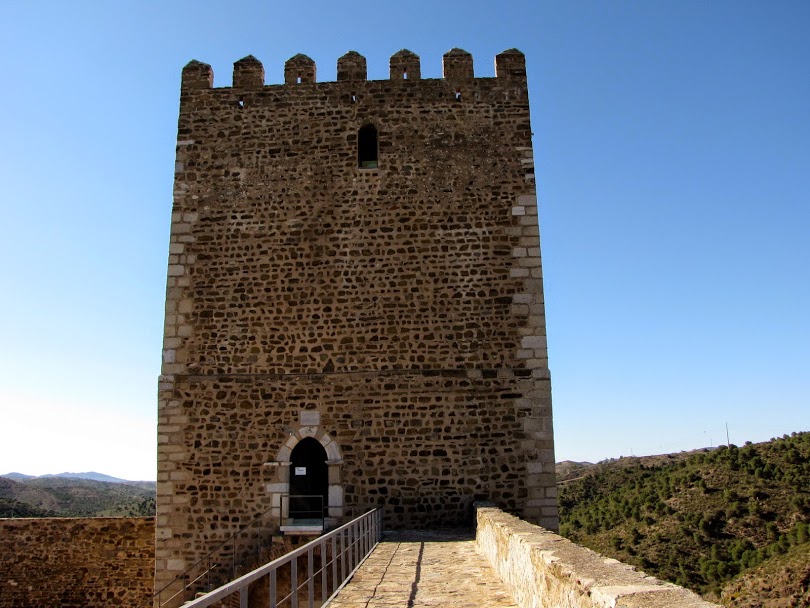
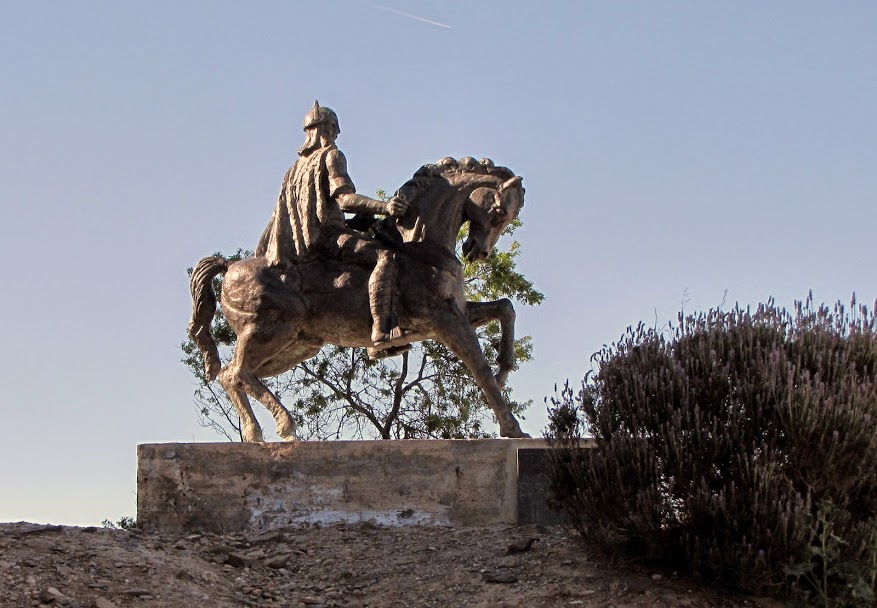
A very old olive tree
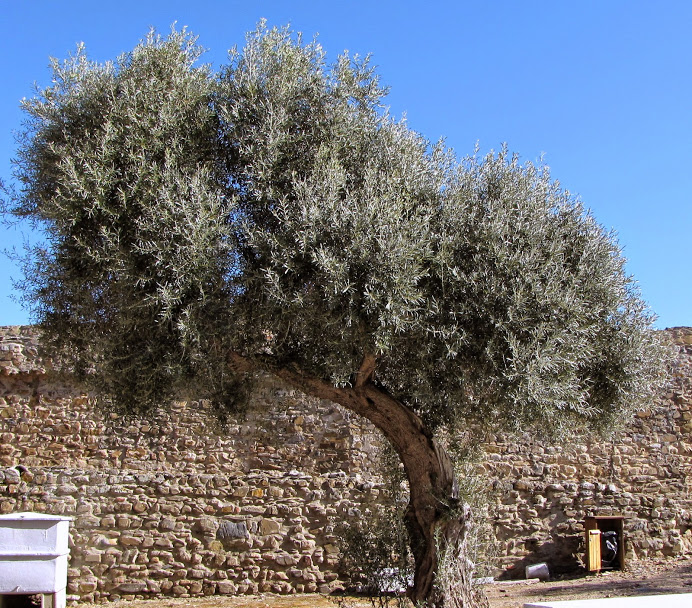
The day of departure from Tavira had arrived and we moved slowly north towards Lisbon, but not the direct route.
First stop and overnight was Mertola in the Natural park of the valley of the Guadiana, the river dividing Portugal and Spain.
Photo of Mertola taken from the castle showing the once mosque, now church.

Finding the way to the hotel was a kind of tour of a labyrinth
The town of Mértola is located on a hill by the Guadiana River, and its strategic location made it an important fluvial commercial port from Classical Antiquity through the period of Islamic domination. Among the vestiges of its past, Mértola's main church was the only medieval mosque to have survived in Portugal.
View before arriving in town



During Classical Antiquity, Mértola was inhabited by Phoenicians, Carthaginians and finally the Romans, who called it Myrtilis Iulia. The strategic location of Mértola, on a hill by the northernmost navigable part of the Guadiana river, was crucial in its early development. Agricultural products grown in the villae nearby and valuable minerals (silver, gold and tin) obtained from the lower Alentejo region were sent from the fluvial port of Mértola via the Guadiana to Southern Hispania and the Mediterranean. The town was raised to the status of a Municipium in times of Emperor Augustus and was connected to important Roman cities (Beja, Évora) through a road system.
During the Migration Period, Mértola was invaded by Germanic tribes of the Sueves and the Visigoths. In this period (5th-8th centuries) commerce was reduced but still active, as evidenced by Greek tombstones from the 6th-7th centuries found in Mértola which suggest the presence of Byzantine merchants in the town.
The river Guadiana

First thing we went to see the Mosque/Church and the castle, quite a climb also having done half of it by car

Around the year 711, Hispania was invaded by the Moors from the Maghreb, inaugurating a period of great influence of Islamic culture in the Alentejo region that would last nearly 500 years. Mértola - then called Martulah - and its port played an important economic role in the commerce of agricultural and mineral goods between the Alentejo and other parts of Al-Andalus (Arab Hispania) and Northern Africa.
Mértola had a wall dating from Roman times, but the Muslims built new fortifications and, eventually, a castle to protect it from rival Muslim and Christian states. After the fall of the Caliphate of Córdoba, in 1031, Mértola became an independent taifa state, until it was conquered by the taifa of Seville in 1044-1045. Between 1144 and 1150 the town was again seat of an independent state led by Ibn Qasi, a mystic and skilled military leader who unified Southern Portugal and fought the power of the Almoravides. The independence of the region, however, was soon ended by an invading Almohad army. The most important remnant from the Islamic period of Mértola is its mosque, built in the second half of the 12th century and later turned into a church, but which still preserves many of its original characteristics.



A very old olive tree

"Education is the most powerful weapon which you can use to change the world." Nelson Mandela
The desire for equality must never exceed the demands of knowledge
The desire for equality must never exceed the demands of knowledge
- Lisbeth
- Site Admin
- Posts: 65899
- Joined: Sat May 19, 2012 12:31 pm
- Country: Switzerland
- Location: Lugano
- Contact:
Re: "Catch of the day" from Algarve
The views from the castle
Old mill

A chapel
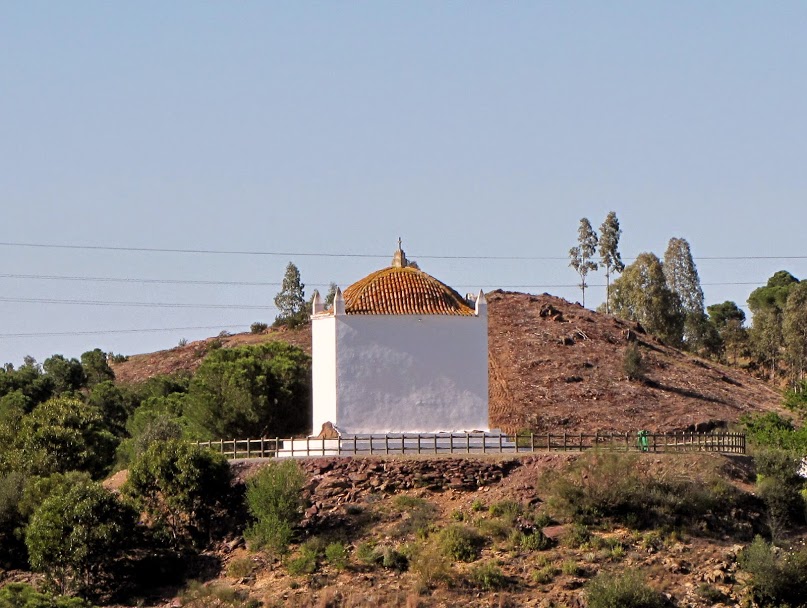
An old clock tower on the river
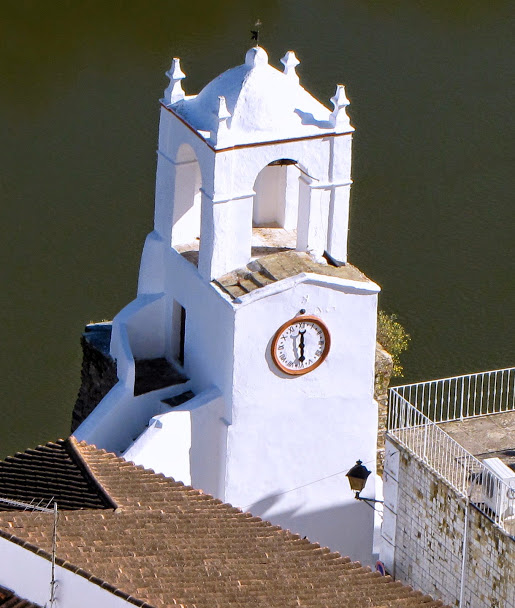
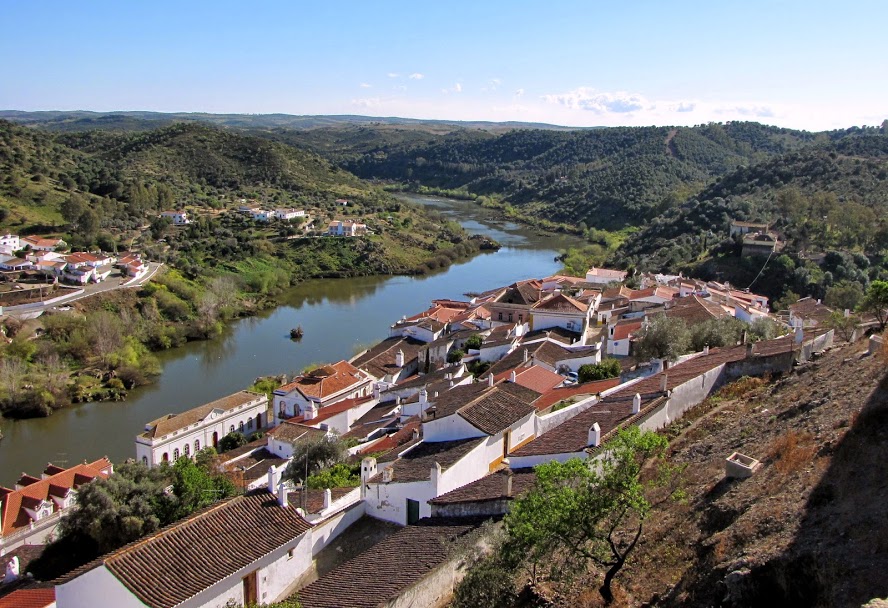
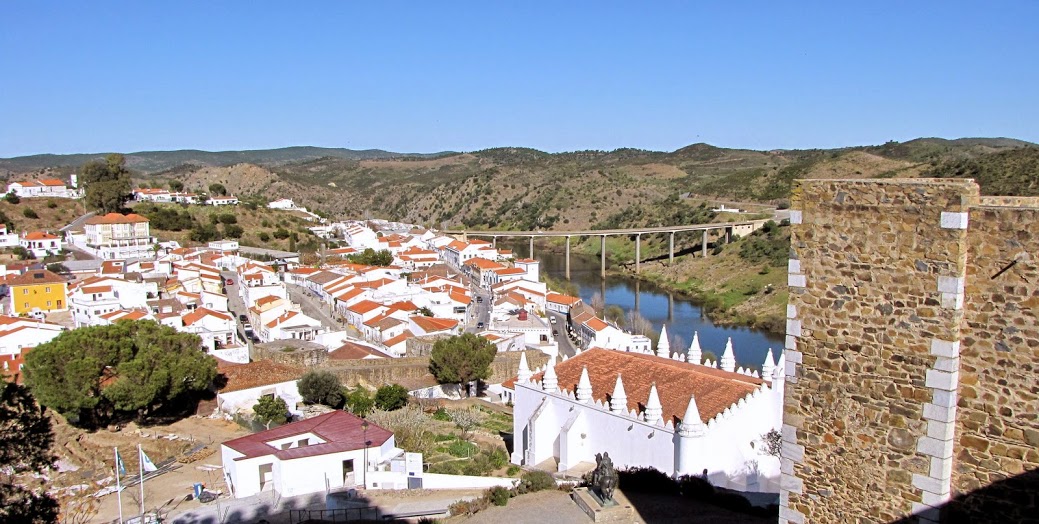
Reconquista
In 1238, in the context of the Reconquista, the town was conquered by Portuguese King Sancho II, putting an end on centuries of Islamic domination in the Mértola region. The town was donated to the Knights of the Order of Santiago, a Military Order that played a vital role in the Christian conquest of Southern Portugal. The seat of the Order was established in Mértola until 1316. From the Reconquista time date most of the castle, including its mighty keep, and a letter of feudal rights (foral), granted in 1254.
With the ties with Northern Africa severed, the economic importance of Mértola and the Guadiana faded after the Reconquista. In the 15th-16th centuries, when the Portuguese conquered several cities in the Maghreb, Mértola experienced a brief revival in its economic relevance, supplying Portuguese troops in Northern Africa with cereals. King Manuel I granted a new foral to the town in 1512.
to be continued....
Old mill

A chapel

An old clock tower on the river



Reconquista
In 1238, in the context of the Reconquista, the town was conquered by Portuguese King Sancho II, putting an end on centuries of Islamic domination in the Mértola region. The town was donated to the Knights of the Order of Santiago, a Military Order that played a vital role in the Christian conquest of Southern Portugal. The seat of the Order was established in Mértola until 1316. From the Reconquista time date most of the castle, including its mighty keep, and a letter of feudal rights (foral), granted in 1254.
With the ties with Northern Africa severed, the economic importance of Mértola and the Guadiana faded after the Reconquista. In the 15th-16th centuries, when the Portuguese conquered several cities in the Maghreb, Mértola experienced a brief revival in its economic relevance, supplying Portuguese troops in Northern Africa with cereals. King Manuel I granted a new foral to the town in 1512.
to be continued....
"Education is the most powerful weapon which you can use to change the world." Nelson Mandela
The desire for equality must never exceed the demands of knowledge
The desire for equality must never exceed the demands of knowledge
- Richprins
- Committee Member
- Posts: 75375
- Joined: Sat May 19, 2012 3:52 pm
- Location: NELSPRUIT
- Contact:
Re: "Catch of the day" from Algarve
Like a fairytale! 
Who DIDN'T invade the town?
When I retire I'm going to buy a whitewash business in Portugal!
Great stuff here, Lis!
Who DIDN'T invade the town?
When I retire I'm going to buy a whitewash business in Portugal!
Great stuff here, Lis!
Please check Needs Attention pre-booking: https://africawild-forum.com/viewtopic.php?f=322&t=596
Re: "Catch of the day" from Algarve
Stunning place to visit Lis.
Love that area with the cliff & pool, bet there were some good birds lurking around there.
Love that area with the cliff & pool, bet there were some good birds lurking around there.
Dewi
What is the good of having a nice house without a decent planet to put it on? (H D Thoreau)
What is the good of having a nice house without a decent planet to put it on? (H D Thoreau)
- Lisbeth
- Site Admin
- Posts: 65899
- Joined: Sat May 19, 2012 12:31 pm
- Country: Switzerland
- Location: Lugano
- Contact:
Re: "Catch of the day" from Algarve
Lots of birds, but they are so fast  I even saw a couple of the pretty ones with the blue tail and lots of swallows, rock pigeons and white storks and also small raptors. There are birds all over the place
I even saw a couple of the pretty ones with the blue tail and lots of swallows, rock pigeons and white storks and also small raptors. There are birds all over the place 
"Education is the most powerful weapon which you can use to change the world." Nelson Mandela
The desire for equality must never exceed the demands of knowledge
The desire for equality must never exceed the demands of knowledge
- Mel
- Global Moderator
- Posts: 26737
- Joined: Sat May 19, 2012 12:31 pm
- Country: Germany
- Location: Föhr
- Contact:
Re: "Catch of the day" from Algarve
RP hit the nail on the head - who didn't invade Mertola... My head is buzzing with all those different peoples. 
Very impressive olive tree! Ours in the backyard look really sad compared to it.
Very impressive olive tree! Ours in the backyard look really sad compared to it.
God put me on earth to accomplish a certain amount of things. Right now I'm so far behind that I'll never die.
Re: "Catch of the day" from Algarve
The buildings do look amazing especially with these colours 
PuMbAa
Please visit our website: www.photomaniacs.de
Please visit our website: www.photomaniacs.de
- Lisbeth
- Site Admin
- Posts: 65899
- Joined: Sat May 19, 2012 12:31 pm
- Country: Switzerland
- Location: Lugano
- Contact:
Re: "Catch of the day" from Algarve
Everything look so sunny, gay and clean 
"Education is the most powerful weapon which you can use to change the world." Nelson Mandela
The desire for equality must never exceed the demands of knowledge
The desire for equality must never exceed the demands of knowledge


